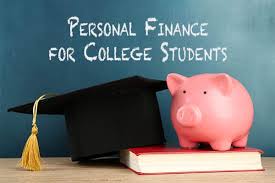Personal finance for college students is often overlooked by students amid the whirlwind of academic and social activities. However, understanding and managing finances are essential skills that can significantly impact a student’s present and future well-being.
Budgeting of Personal Finance for College Students

Creating a budget is the cornerstone of financial management. By outlining income and expenses, students can gain clarity on their financial situation. Tracking expenses helps in identifying areas where spending can be reduced or optimized, ensuring financial stability.
Saving Strategies
Saving money is vital for college students, providing a safety net for unexpected expenses and future goals. Implementing saving methods such as automatic transfers to a savings account or setting specific savings targets can instill disciplined financial habits.
Part-Time Jobs
Part-time jobs offer more than just additional income. They provide valuable work experience, develop time management skills, and teach financial independence. Finding suitable part-time opportunities, whether on or off-campus, can significantly contribute to a student’s financial well-being.
Scholarships and Grants
Exploring scholarship and grant options is crucial for reducing the financial burden of college education. Students should actively seek out available opportunities and submit compelling applications to secure financial assistance.
Student Loans
While student loans can be a necessary means to fund education, understanding the terms and implications is essential. Managing loan repayments responsibly can prevent long-term financial strain and minimize debt accumulation.
Credit Cards
Responsible use of credit cards can help students build a positive credit history. However, it’s essential to use them wisely, avoiding excessive debt and making timely payments to avoid high-interest charges.
Financial Goals
Setting both short-term and long-term financial goals provides direction and motivation. Whether it’s saving for a trip abroad or planning for graduate school, establishing clear objectives and developing strategies to achieve them is paramount.
Investing Basics
Introducing students to the basics of investing empowers them to grow their wealth over time. Starting with small investments in low-risk options like mutual funds or index funds can kickstart their journey towards financial independence.

Emergency Funds
Building an emergency fund safeguards against unexpected financial setbacks, such as medical emergencies or car repairs. Even small contributions to an emergency fund can provide peace of mind and financial security.
Avoiding Debt
Strategies for avoiding debt, such as living within means, prioritizing needs over wants, and seeking alternatives to loans, help students steer clear of financial pitfalls. Addressing existing debt promptly and responsibly is crucial for maintaining financial health.
Financial Literacy Resources
Utilizing online resources, such as budgeting apps, financial podcasts, and educational websites, enhances students’ financial literacy. Seeking guidance from financial advisors or attending workshops can further supplement their knowledge and skills.
Conclusion: Success Personal Finance for Students
In conclusion, personal finance is a vital aspect of college life that warrants attention and proactive management. By adopting sound financial practices, setting achievable goals, and seeking guidance when needed, college students can lay a strong foundation for a secure financial future.
FAQs About Personal Finance for College Students
1. How can college students start building credit histories responsibly? To build a credit history, college students can start by obtaining a secured credit card or becoming an authorized user on a parent’s credit card. They should use credit cards sparingly, make timely payments, and keep credit utilization low.
2. What are some effective ways for college students to save money? College students can save money by opting for used textbooks, cooking meals at home instead of eating out, using public transportation or biking instead of owning a car, and taking advantage of student discounts wherever possible.
3. Is it advisable for college students to invest while still in school? Yes, college students can begin investing even with small amounts of money. Starting early allows them to benefit from the power of compounding and build wealth over time. However, it’s essential to research investment options carefully and seek professional advice if needed.
4. How can college students avoid falling into debt traps? College students can avoid debt traps by creating and sticking to a budget, limiting credit card usage, prioritizing needs over wants, and seeking alternative sources of funding such as scholarships, grants, and part-time jobs.
5. What are some reliable resources for improving financial literacy? Several online resources can help improve financial literacy, including websites like Investopedia, Khan Academy’s Personal Finance section, and podcasts like “The Dave Ramsey Show” and “Financial Independence Podcast.” Additionally, many universities offer financial literacy workshops and seminars for students.








